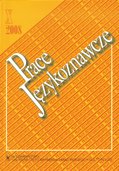Proto-Indo-European root *h2engh- ‘go crooked, go round, meander’ and other phonetically and semantically similar roots in appellatives and names of rivers in the Germanic, Baltic and Slavic territories
Praindoeuropejski rdzeń *
h
2
eng
h
-
‘krzywić się,
kręcić, wić się’ oraz inne rdzenie fonetycznie
i semantycznie zbliżone w apelatywach
i nazwach rzek na obszarze germańskim,
bałtyckim i słowiańskim
Author(s): Maria Biolik, Jerzy DumaSubject(s): Language and Literature Studies
Published by: Wydawnictwo Uniwersytetu Warmińsko-Mazurskiego w Olsztynie
Keywords: hydronymia; etymology; Indo-European languages; contamination; water names; hydronymic cores; names of rivers: Angerbach; Angelbach; Unkenbach; Węgorapa; Wągra; Wiar
Summary/Abstract: The article attempts to perform an etymological analysis of selected water names, mainly river names, etymologically related to the pre-Indo-European core *h2engh- /*h2gh- ‘curl, twist, wind’ and with other phonetically and semantically similar cores, e.g. *h2enk ‘to turn around, wind, bend’, *eng- ‘bypass’ etc. They were recorded in appellatives and river names in the Germanic, Baltic and Slavic territories. They could have been formed during the period of the movement of pre-Indo-European ethnic groups which were poorly linguistically differentiated. The article presents the most probable etymologies of the names of rivers such as: Angerbach, Angelbach, Unkenbach, Węgorapa, Wągra, Wiar etc. against a broader appellative and proprial background. It has been determined that in the appellative sphere, the core *h2engh- and similar cores, e.g. *h2enk- ‘crooked, bent’, *eng- ‘avoid, bypass, evade, twist’ are also found in common words in the areas were not only Slavic, Baltic and Germanic, but also Greek and other Indo-European languages were used. This article adopts methodologies developed within structuralism, based on the assumptions adopted in Germany that the old water names do not belong to any of the modern Indo-European languages and were created before the development of historical languages found in a given area in the first millennium AD.
Journal: Prace Językoznawcze
- Issue Year: 22/2020
- Issue No: 2
- Page Range: 5-22
- Page Count: 17
- Language: Polish

